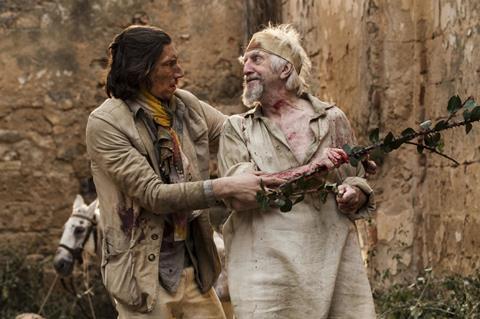
The Paris Court of Appeal has ruled in favour of producer Paulo Branco in the latest twist in the case over who owns the rights to UK director Terry Gilliam’s turbulent production The Man Who Killed Don Quixote, which premiered at the Cannes Film Festival in May.
The appeals court judge ruled a contract drawn up and signed by Branco and Gilliam in 2016 – confirming the Portuguese producer’s rights to Gilliam’s long-gestated film – remained intact.
Friday’s decision also demands Gilliam pay Branco’s Paris-based production house Alfama Films €10,000 ($11,600) towards the costs of launching the appeal.
For his part, Gilliam has always held Branco did not deliver the finance he had promised for the production, thus rendering the contract null and void.
The ruling is the latest twist in an 18-month battle between Branco and Gilliam over who owns the rights to The Man Who Killed Don Quixote, during which time the producer has attempted to block its production as well as its premiere at the Cannes Film Festival in May and then its worldwide release, kicking off in France.
Speaking to Screen about the ruling, Branco said he would be seeking damages with interest from all the parties who had produced and exploited the film without the consent of Alfama Films.
”The ruling means that the rights to the film belong to Alfama. Any exploitation of the film up until now has been completely illegal and without the authorisation of Alfama,” said Branco. “We will be seeking damages with interest from all the people involved in this illegal production and above all, all those who were complicit in its illegal exploitation. We’re holding everyone responsible.”
Branco said these parties would include Gilliam as well as “the film’s producers, [Paris-based sales company and producer] Kinology, all the others who supported the film, including those who distributed the film in France [Ocean Films] and the Cannes Film Festival, everyone.”
Branco said he found it “astounding” that all these parties had continued with the production and exploitation of the film without holding the rights.“The film belongs in its entirety to Alfama. The film was made illegally. It’s the first time, I’ve ever seen so many people embark on a mission to produce and exploit a film, without holding the rights. It’s a unique case.”
Branco’s son and lawyer Juan Branco announced the legal victory via his Twitter account on Friday. “Victory at the appeals court against Terry Gilliam. All our rights are confirmed. Everything that was put forward to contend the screening in Cannes and in the theatres. Voila,” he wrote. “For me, this is very important because I spoke out publicly about this case with determination and also given the cynicism with which the establishment, Thierry Frémaux and [Minister of Culture] Francoise Nyssen – in a shameful conflict of interests for the latter, responded,” he added.
The Cannes Film Festival was highly critical of Branco’s attempts to block the film’s premiere, issuing a stiff official rebuke in the lead up to the festival. Friday’s ruling comes some five weeks after the contested screening and its simultaneous release in French theatres, where it has drawn some 110,000 spectators to date.
It is a case that looks set to run and run.






















No comments yet